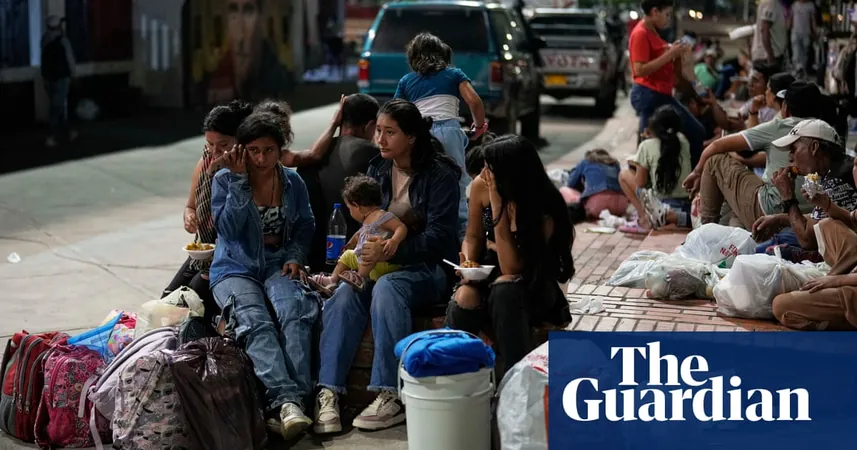
Colombia Faces Humanitarian Crisis as Thousands Flee Violent Rebel Clashes
2025-01-22
Author: Ying
As Colombia grapples with an escalating humanitarian crisis, authorities in the border city of Cúcuta are scrambling to manage an unprecedented influx of internal refugees. Thousands of civilians have been fleeing brutal fighting between rival rebel factions, forced to abandon their homes in northeastern Colombia.
Since the outbreak of violence last Friday, Cúcuta has witnessed a historical exodus, with nearly 15,000 people arriving in just four days—an unprecedented figure for both the city and, sadly, for the country. "We have experienced refugee inflows before, but this is unlike anything we've seen," remarked Cúcuta's mayor, Jorge Acevedo.
The grim toll of the conflict has been alarming: at least 80 people have lost their lives, with more than 32,000 displaced as the ELN (National Liberation Army), the world’s oldest active guerrilla group, intensifies its violent campaign to control one of Colombia’s largest cocaine-producing regions. The ELN has targeted civilians, often conducting door-to-door searches for individuals suspected of sympathizing with rival factions, leading to widespread fear and chaos.
Colombian ombudsman Iris Marín Ortiz highlighted the indiscriminate nature of these attacks, which have left victims vulnerable simply due to family ties or personal relationships. "Civilians are being hunted down, with allegations of collaboration being made without any due process," she stated.
In another flashpoint, fierce clashes between drug trafficking gangs in the Guaviare jungle region have resulted in at least 20 additional fatalities. The pervasive violence has forced President Gustavo Petro to declare an "economic emergency" in response to the escalating humanitarian needs. This urgent measure aims to allocate much-needed resources to assist the burgeoning refugee population, which is also crossing into Venezuela as the conflict intensifies.
In a bold and controversial move, Petro signaled that he would declare a “state of internal unrest,” a drastic measure reminiscent of strategies used by past leaders when armed groups threatened to overrun cities. The current crisis has become one of the worst bouts of violence in Colombia in recent years, pushing local authorities to their limits.
“Refugees are arriving with nothing but the clothes on their backs. Some come dirty, in shorts and without shoes. They fled with whatever they could carry, and their needs are dire,” said Leandro Ugarte, Cúcuta's secretary of post-conflict. The local football stadium has been repurposed as an emergency shelter, accommodating migrants until further arrangements can be made.
The Catatumbo region, known for its coca crop production and proximity to the Venezuelan border, has historically experienced violence, but the scale of the current unrest has shocked even seasoned observers. Ortiz emphasized, “This is one of the gravest humanitarian crises that Catatumbo has ever faced.”
Adding to the heartbreak, approximately 46,000 children are now out of school due to the violence, and families struggle to even retrieve the bodies of their loved ones for burial.
Colombia’s hopes for lasting peace were pinned on a 2016 agreement with the Revolutionary Armed Forces of Colombia (FARC) that brought an end to decades of conflict with the country's largest guerrilla army. However, the peace process has faltered as new factions have emerged to fill the power vacuum left by the FARC, often employing ruthless tactics and recruiting children into their ranks.
Petro recently halted peace negotiations with the ELN, as the violence reached critical levels. The government has recommenced arrest warrants for 31 ELN commanders, which had previously been suspended to facilitate talks. "We have long warned of a potential resurgence of conflict in Colombia, and it appears we are witnessing that reality right now," stated Elizabeth Dickinson, a senior analyst at the NGO Crisis Group.
The president, who has long advocated for dialogue with armed groups, now faces a significant challenge in maintaining stability. While thousands of soldiers have been dispatched to the region to restore order, their efforts have yet to yield significant results against the entrenched violence of the rival factions.
As the refugee situation intensifies—an additional 1,000 displaced individuals arrived in Cúcuta just this past Tuesday—Cúcuta's mayor expressed hope for a sustainable resolution. “We need the military to establish control and stability in this territory once and for all," Acevedo urged, yet progress remains slow in the face of ongoing conflicts.




 Brasil (PT)
Brasil (PT)
 Canada (EN)
Canada (EN)
 Chile (ES)
Chile (ES)
 Česko (CS)
Česko (CS)
 대한민국 (KO)
대한민국 (KO)
 España (ES)
España (ES)
 France (FR)
France (FR)
 Hong Kong (EN)
Hong Kong (EN)
 Italia (IT)
Italia (IT)
 日本 (JA)
日本 (JA)
 Magyarország (HU)
Magyarország (HU)
 Norge (NO)
Norge (NO)
 Polska (PL)
Polska (PL)
 Schweiz (DE)
Schweiz (DE)
 Singapore (EN)
Singapore (EN)
 Sverige (SV)
Sverige (SV)
 Suomi (FI)
Suomi (FI)
 Türkiye (TR)
Türkiye (TR)
 الإمارات العربية المتحدة (AR)
الإمارات العربية المتحدة (AR)